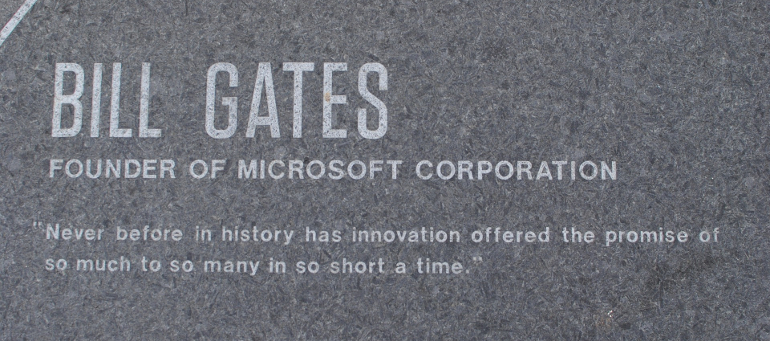
A Framework for Evaluating Business Ideas (NECST)
Do you know how to get really, really rich?
That’s right.
You need to build and grow a highly profitable business, of which you have as much ownership as possible.
If you examine the list with the wealthiest people in the world, you will notice that the vast majority of those have founded companies that have grown to epic proportions.
Since they have kept a significant amount of ownership in them, these people are currently enjoying a tremendously high net worth.
The key to becoming rich boils down to being a business owner.
Want to get my eBook "From Employee to Online Entrepreneur" as a nice PDF? Download it below!
The Right Kind of Business
But as I have mentioned before, you can’t just start any type of business and hope that it will lead you to the land of riches.
No!
You need to launch a business venture that fulfills a specific set of criteria. If these requirements, about which we are going to talk in this article, are not met, then your business is going to fail. Even worse, it will struggle to survive and waste your precious time, hanging between life and death.
So how do you assess if your business idea is one that has the capacity to make you a successful business owner?
The best approach that I have encountered so far, comes from one of my favorite books, “The Millionaire Fastlane”, by author MJ DeMarco.
In that book, DeMarco introduces the concept of the “Fastlane Business”, which is a business that has the potential to propel you to wealth in a short timespan of a few years.
Note that the “Fastlane” is not just a type of business. It is a business and lifestyle strategy that allows for fast wealth building and living the kind of lifestyle that you aspire to. For this analysis though, we will focus on the business aspect of it.
Enter the Five Commandments of Fastlane
In order to determine the potency of a business, DeMarco also introduces five distinct “Commandments” that you can examine your business proposition against.
The five commandments comprise a solid framework, aptly called “NECST” (or sometimes “CENTS”), which we can use to analyze ideas and pre-empty those that would not be good candidates. Here they are:
- Commandment of Need
- Commandment of Entry
- Commandment of Control
- Commandment of Scale
- Commandment of Time
The more commandments satisfied by your business, the larger the potential it has to make you really wealthy. Ideally, you should strive to have all the commandments satisfied at the highest level possible.
Note, however, that it is not always possible to satisfy all of them at the same time, and often you will have to “sacrifice” one in favor of another.
Let’s discuss what each of those entails.

Commandment of Need
This is probably the most important commandment of all, and this is where most aspiring entrepreneurs drop the ball.
The most critical thing about launching a new business is that is should be based on a Need existing in the marketplace. This could be a pain point that customers want eliminated, or an inefficiency present in the current offerings from the other players.
As I have highlighted in the past, making money essentially means providing vast amounts of value to the marketplace. In order to do so and have people trade their money for your product or service, you need to make sure that what you offer is something that people want or, even better, need.
This is where market research comes into play. Prior to entering a specific industry or market, you need to have a solid understanding of it. You need to have pinpointed some inefficiency or a gap in the market, and this is where your value proposition will reside.
If your business is another “me too” business, it is doomed to fail.
The number one reason why new businesses get shut down is because they fail to address a market need. They offer products or services that the world would not care less about. This is most prevalent in the recent years that have witnessed the proliferation of social apps that people don’t care about or don’t care about enough to pay for.
For this reason, the first thing to ensure before getting all excited about your new venture is that it focus on a specific market need. Get the need fulfilled and the money will follow.
Commandment of Entry
The commandment of Entry dictates that the barriers to entry into a specific market should be high enough to prevent low level competition. Otherwise, your product or service runs the risk of being commoditized, i.e. not recognizable from the consumers.
In short, the easier it is for someone to start a business similar to yours, the less likely it is that you are going to enjoy great success.
The reason is that the marketplace will soon get flooded by competitors who will saturate the market and drive margins and profits down for everyone.
Because of this, you need to build what Warren Buffett characterizes as an “Economic moat” around your business:
“The term economic moat, coined and popularized by Warren Buffett, refers to a business’ ability to maintain competitive advantages over its competitors in order to protect its long-term profits and market share from competing firms.”
Thus, before you get started with your new venture, you need to do an honest self-investigation and figure out what your competitive advantage is going to be.
Do you have a team of intelligent programmers that will develop a sophisticated software algorithm that cannot be easily replicated?
Are you a top-notch Internet Marketer that can drive traffic to a website and achieve high conversions?
Do you have insider knowledge to a certain industry that only a few select people have?
Note that sometimes launching a concept with low barriers to entry can indeed be highly lucrative, provided that you are the first in the market to launch it (first mover’s advantage). However, this does not happen quite often.
To make sure you fulfill the criterion of Entry, you need to go after an industry with high barriers of entry and at the same time, hone a competitive advantage that will allow you to rise above the competition.
Commandment of Control
This commandment simply states how much control do you essentially have over the future of your business. If an external entity (e.g. another company) has the ability to make a change and impact your business in a harmful way, then you are lacking control.
The most typical example is that of search engine traffic that blogs and web properties enjoy. If you have a website that receives the majority of its traffic from Google, then you are at the mercy of the search engine giant. One change in its internal algorithm, and you might lose a significant amount of your traffic and therefore revenue.
For this reason, as a website owner in the above scenario, you need to diversify your incoming traffic channels and hedge your risk. One way to accomplish this, is by capturing the email information of the website’s visitors. This is one of the reasons that I am running an insider’s newsletter, over which I have the sole control (hop on to the newsletter here).
As a rough guideline, you should strive to have as much control as possible over your business, your brand, your assets and intellectual property.

Commandment of Scale
Perhaps my favorite commandment. I have highlighted in the past that you need a venture that can scale. On top of that, I have mentioned time and again that the right kind of business to start is one that is scaleable and saleable.
But what does scale really mean?
Think of it as how many people you can impact.
In order to get millions, you need to impact millions. Therefore, your business should be capable of catering to the needs of thousands, if not millions, of people.
A small bakery shop cannot realistically have thousands of customers per day. However, an online company providing a service over the internet can.
Another important aspect of this commandment, that is not often discussed, is how large the relevant market is. This goes with the fancy name of “Total Addressable Market” (or TAM) and essentially represents the total number of customers that would potentially need a solution similar to the one you are offering multiplied by the amount of money they are willing to spend for that solution.
As you understand, the larger the total addressable market is, the larger the potential for wealth is. Bear in mind though that in some cases it is more preferable to go into a smaller market (a niche) and dominate it, rather than play against the big boys in a huge market and get crushed.
Commandment of Time
The final commandment, yet so important. This one essentially states that if you’re trading your time for money in any way, then you’re definitely not in the fastlane.
If the core of your business depends on you being present in a particular place and time, then you have failed miserably the commandment of time and you will struggle to get the big money.
This is where people that start as freelancers (e.g. accountants, software developers, designers etc.) usually mess things up. They can’t let go of their ego and they keep working in their business instead of on their business, meaning that they are involved in the day to day technicalities instead of focusing on the larger vision.
What you should do instead is create systems. Those systems, consisting of checklists, procedures, operation manuals etc., will allow your business to operate in a predictable and consistent way without being dependant on your presence (or anyone’s else for that matter).
In an ideal scenario, you should be able to leave your business for a year or more, then come back and find out that not only it has not been devastated, but it has actually grown in revenue and profitability.
Consider this a litmus test. If you cannot even fathom how this can be achieved in a specific business, then the commandment of time has been violated.
A perfect example of a Fastlane Business
Fastlane businesses are all around us. They are the businesses that you interact almost on a daily basis. Let’s analyze one of them and see how it fulfills the various commandments.
Bill Gates is one of the wealthiest people alive and his wealth was created by founding and growing Microsoft, one of the largest companies in the world.
Microsoft is a perfect example of Fastlane. Here is how it nails all commandments.

Need: When Microsoft was launched, the world was in the middle of a radical transformation. The Personal Computer was being introduced to daily office life and workers were in need of software that would made them work more efficiently and effectively. Microsoft came in with its suite of products (Windows, Office etc.) to fill in that need.
Entry: Creating an Operating System from scratch or building a sophisticated piece of software like Office is not an easy feat. In fact, the barriers of entry are so high that almost no other company has managed to remotely challenge Microsoft in those fronts.
Control: By building its own software and avoiding to rely on other players (after it has managed to stand on its feet), Microsoft and Gates were in control of their destiny. They did not depend to outside parties and retained total control of their business.
Scale: Oh my, this is probably the most potent catalyst of this business. First of all, the total addressable market for Microsoft is almost the whole planet. Anyone with a PC or a device is a potential customer. At the same time, software, due its nature, can scale incredibly well and enjoys insane economies of scale. This combination has lead to Microsoft being worth several hundred billion dollars.
Time: It would be impossible for Gates to build such an empire if he could not decouple his own time from the underlying business. He managed to create a humongous company consisting of systems, processes and procedures, giving birth to something grander than himself and essentially a legacy.
The rise and dominance of Microsoft, and the vast wealth that Bill Gates has accumulated because of it are first class testimonies to the significance of the “Fastlane”.
Conclusion
In order to properly evaluate business ideas and propositions, and be able to reject those that will not bring you the results that you aspire to, you need a solid framework that will help you with the assessment.
One of the most helpful and valuable frameworks is NECST, a series of commandments that need to be fulfilled in order for a venture to truly be worth of your time.
By checking a business idea against the 5 commandments (Need, Entry, Control, Scale, Time) we can quickly assess if a venture is promising or destined to fail.
Stay tuned for the next articles where we will examine some online businesses and put them to scrutiny under NECST!





Awesome overview of NECST. I will definitely have to look into this book. Your overview is terrific and I would love to dig deeper into this. Thanks for sharing!!!
Glad to help! Thanks for stopping by!